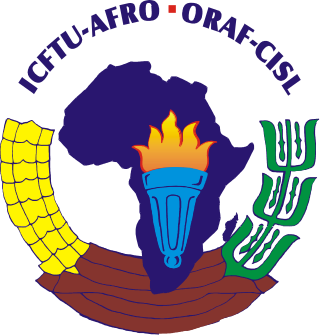
The International Confederation of Free Trade Unions (ICFTU) was an international trade union. It came into being on 7 December 1949 following a split within the World Federation of Trade Unions (WFTU), and was dissolved on 31 October 2006 when it merged with the World Confederation of Labour (WCL) to form the International Trade Union Confederation (ITUC).

The World Federation of Trade Unions (WFTU) is an international federation of trade unions established in 1945. Founded in the immediate aftermath of World War Two, the organization built on the pre-war legacy of the International Federation of Trade Unions as a single structure for trade unions world-wide, following the World Trade Union Conference in London, United Kingdom.

The World Confederation of Labour (WCL) was an international labour organization founded in 1920 and based in Europe. Fascist governments of the 1930s repressed the federation and imprisoned many of its leaders, limiting operations until the end of World War II. In 2006 it became part of the International Trade Union Confederation (ITUC), ending its existence as an independent organization.

The International Textile, Garment and Leather Workers' Federation (ITGLWF) was a global union federation. In 2005 it had 217 member organizations in 110 countries, representing a combined membership of over 10 million workers.
The ITUC Regional Organisation for Asia and Pacific is a regional organisation of the International Trade Union Confederation representing trade unions from countries in Asia and Oceania. It has 40 affiliated organisations in 28 countries, claiming a membership of 30 million people.

The ITUC Regional Organisation for Africa (ITUC-Africa) is a regional organisation of the International Trade Union Confederation, representing trade unions from countries in Africa. There are 56 national trade union federations affiliated to ITUC-Africa, from 45 countries, and representing a total of 15 million workers.

The Latin American Confederation of Workers, was the World Confederation of Labour's (WCL) regional organization for Latin America and the Caribbean. The WCL merged with the International Confederation of Free Trade Unions in 2006, and in 2008, CLAT merged with the ICFTU Inter American Regional Organisation of Workers to form the Trade Union Confederation of the Americas.

The Bangladesh Jatiotabadi Sramik Dal is a national trade union federation in Bangladesh and an affiliate of Bangladesh Nationalist Party. It is affiliated with the International Trade Union Confederation. Anwar Hossain is the president of Jatyatabadi Sramik Dal.
Workers' Memorial Day, also known as International Workers' Memorial Day or International Commemoration Day for Dead and Injured, takes place annually around the world on April 28, an international day of remembrance and action for workers killed, disabled, injured, or made unwell by their work. In Canada, it is commemorated as the National Day of Mourning.
Tanong Po-arn was a Thai labour union leader who disappeared following the 1991 Thai coup d'état by National Peace Keeping Council against the elected government.

The International Trade Union Confederation (ITUC) is the world's largest trade union federation.

The ICFTU African Regional Organisation (AFRO) was a regional organisation of the International Confederation of Free Trade Unions (ICFTU), representing trade unions from countries in Africa.

The ICFTU Inter American Regional Organisation of Workers was the regional organization of the International Confederation of Free Trade Unions (ICFTU) for the Americas.

The Ghana Trades Union Congress is a national centre that unites various workers' organizations in Ghana. The organization was established in 1945.
The Plantation Workers International Federation was an international trade secretariat of the International Confederation of Free Trade Unions. PWIF was founded at the firth ICFTU world congress held in Tunis in July 1957. Samuel Powell Claret was appointed as the general secretary of PWIF and Tom Bavin as its Director of Organisation. PWIF was launched by ICFTU to organize plantation unions in the Third World.

Palayil Pathazhapurayil Narayanan was a Malaysian trade unionist.
The World Federation of Industry Workers (WFIW) was a global union federation representing workers in a range of primary and secondary industries.
Govindasamy Rajasekaran was a Malaysian trade union leader.












